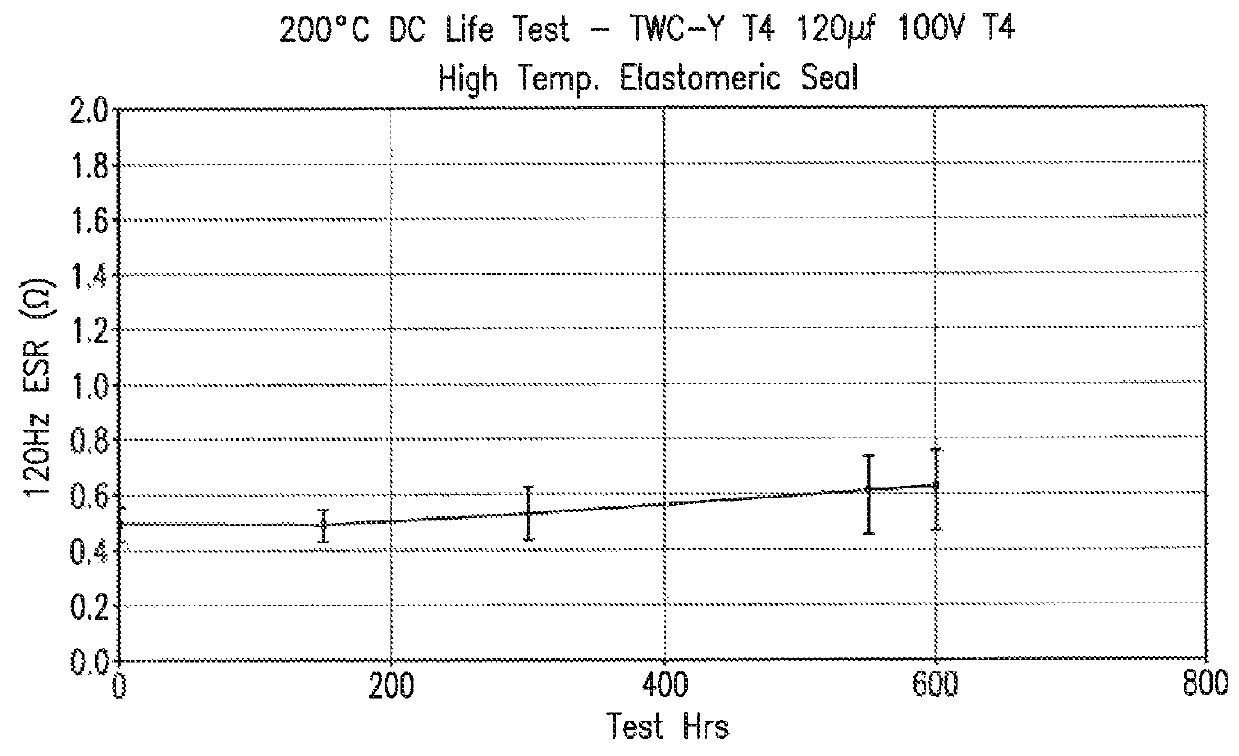Wet electrolytic capacitor for use at high temperatures
a technology of wet electrolytic capacitors and high temperatures, which is applied in the manufacture of liquid electrolytic capacitors, electrolytic capacitors, electrolytic capacitors, etc., can solve the problems of leakage around conventional non-hermetic polymeric seals, and the hermetic seal itself can sometimes become corroded by liquid electroly
- Summary
- Abstract
- Description
- Claims
- Application Information
AI Technical Summary
Benefits of technology
Problems solved by technology
Method used
Image
Examples
example 1
[0070]86 μF / 100V samples were assembled as described herein with an anodically oxidized tantalum anode, a cathode that contains a sintered tantalum coating on the interior surface of a cylindrical tantalum can, and a sulfuric acid working electrolyte. Prior to applying the sintered tantalum coating, the interior surface of the tantalum can was anodized at formation voltages of 5, 7, and 10 V. The resulting capacitors were tested at 200° C. for ESR under applied voltages of 60V and 75V. The results are shown in FIG. 2, As shown, the 5 Vf cathode yielded a 117% increase in ESR after 600Hrs, compared to only a 23% increase for the 7 Vf cathode and only a 2.4% increase for the 10 Vf cathode. Capacitors tested under an excessive voltage condition of 75 V yielded a 262% increase in ESR after 600Hrs, compared to 197% for the 7 Vf cathode and 100% for the 10 Vf cathode.
example 2
[0071]120 μF / 100V samples were assembled as described herein with an anodically oxidized tantalum anode, a cathode that contains a sintered tantalum coating on the interior surface of a cylindrical tantalum can, and a sulfuric acid working electrolyte. The samples contained an elastomeric barrier seal as described herein. The resulting capacitors were tested at 200° C. for ESR under an applied voltage of 60V. The results are shown in FIG. 3. As shown, the capacitors yielded an increase of only 27% after 600 hours.
PUM
| Property | Measurement | Unit |
|---|---|---|
| thickness | aaaaa | aaaaa |
| temperature | aaaaa | aaaaa |
| elongation at break | aaaaa | aaaaa |
Abstract
Description
Claims
Application Information
 Login to View More
Login to View More - Generate Ideas
- Intellectual Property
- Life Sciences
- Materials
- Tech Scout
- Unparalleled Data Quality
- Higher Quality Content
- 60% Fewer Hallucinations
Browse by: Latest US Patents, China's latest patents, Technical Efficacy Thesaurus, Application Domain, Technology Topic, Popular Technical Reports.
© 2025 PatSnap. All rights reserved.Legal|Privacy policy|Modern Slavery Act Transparency Statement|Sitemap|About US| Contact US: help@patsnap.com



